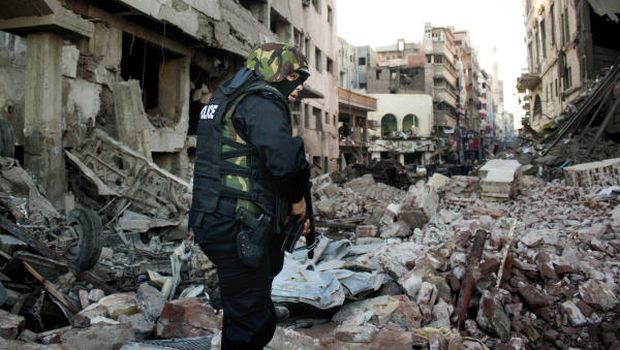
An Egyptian policeman stands guard at the scene of an explosion at a police headquarters building that killed at least a dozen people, wounded more than 100, and left scores buried under the rubble, in the Nile Delta city of Mansoura, 70 miles north of Cairo, Egypt, Tuesday, December 24, 2013. (AP Photo/Ahmed Ashraf)
Mansoura, AP—A powerful explosion believed to have been caused by a car bomb ripped through a police headquarters in a Nile Delta city north of Cairo early on Tuesday, killing 12 people and wounding more than 100, while leaving scores buried under the rubble.
The country’s interim government accused the Muslim Brotherhood of orchestrating the attack, branding it a “terrorist organization.” But the Islamist group condemned the bombing, describing it in a statement as a “direct attack on the unity of the Egyptian people” and demanding that the perpetrators be found and brought to justice.
It was the first major bombing in the Nile Delta, spreading the carnage that has marked Egypt’s turmoil over the past months to a new area and bringing it closer to Cairo. Previous deadly violence has mostly taken place in the volatile Sinai Peninsula and in Suez Canal-area cities east of the Egyptian capital.
The 1:10 am blast struck at the security headquarters in the city of Mansoura, 70 miles north of Cairo in the Nile Delta province of Dakahlia, collapsing an entire section and side wall of the five-floor building, incinerating dozens of cars outside and damaging several nearby buildings.
The state news agency MENA said 12 people were killed, including eight police officers, and that 134 were wounded, among them the city’s security chief and his assistant. Most of the victims were policemen, many of whom were buried beneath the debris.
Associated Press video from the scene showed bulldozers clearing the rubble outside the security headquarters, as charred and wrecked cars littered the street.
Egypt’s interior minister Muhammad Ibrahim toured the scene of the explosion at daybreak, pledging that the police will “continue their battle against the dark terrorist forces that tried to tamper with the country’s security,” then went to hospital to visit the wounded.
MENA quoted Cabinet spokesman Sherif Shawki as saying that the Brotherhood showed its “ugly face as a terrorist organization, shedding blood and messing with Egypt’s security.”
Prime Minister Hazem El-Beblawi described the attack as a “terrorist incident,” expressed condolences to the families of the victims and vowed that the perpetrators “will not escape justice.”
A security official, speaking on condition of anonymity because he was not authorized to talk to the media, said the preliminary investigation indicated a car bomb caused the explosion, which also damaged a nearby bank and a theater.
Security forces cordoned off the whole area around the bombing site, closed major entrances and exits to Mansoura and set up checkpoints to search for perpetrators. State TV called on residents to rush to hospitals to donate blood.
No one immediately claimed responsibility for the bombing, which came a day after an Al-Qaeda-inspired group called on police and army personnel to desert or face death at the hands of its fighters.
The militant group based in Sinai and several others have claimed responsibility for a surge of attacks on security forces since a popularly-backed coup in July toppled the country’s former Islamist president, Mohamed Mursi, who hails from the Brotherhood.
In response, Egypt’s armed forces launched an offensive against militants in the northern part of Sinai in August. Coupled with the offensive and with Mursi ousted and imprisoned, Egyptian investigators have moved to put him on trial for links to militants, accusing him and the Brotherhood of being behind the wave of violence in Sinai.
Tuesday’s bombing was not the first time that the security headquarters in Mansoura was targeted. Weeks ago, an explosion went off in front of the building but caused no casualties. Since the summer coup that ousted Mursi, militant Islamists have attacked several security headquarters with car bombs or by suicide bombers.
On Saturday Egyptian prosecutors referred Mursi to a third trial on new charges including treason and collaborating with terrorist organizations, all of which carry the death penalty.
The Mansoura attack came shortly after the Islamic militant group Ansar Bayt Al-Maqdis, or the Champions of Jerusalem, threatened more attacks on the military and police, saying it considers Egyptian troops to be infidels because they answer to the secular-leaning military-backed government.
The group—which gained notoriety after expanding its operations outside of the restive northern Sinai province—has claimed responsibility for a number of suicide car bombings and deadly attacks, including a failed assassination attempt on Egypt’s interior minister in September. The minister escaped unharmed.
Ansar Bayt Al-Maqdis is believed to have ties with Palestinian militants in the neighboring Gaza Strip, and officials have said other foreign militants have found refuge in Sinai during the ongoing turmoil.
In its message, which appeared on militant websites Monday, the group said it “will be more determined to fight” the military and police if its warning is ignored. It urged them to “repent” from participating in “this infidel bastion that is at war with God and his Prophet, and stop serving in its ranks.”
But MENA quoted Shawki, the Cabinet spokesman as saying that “such terrorist operations will not prevent us from moving forward with the road map.”
He was referring to the upcoming referendum on a draft constitution January 14-15, a key step in a military-backed transition plan aimed at holding presidential and parliamentarian elections later next year.
